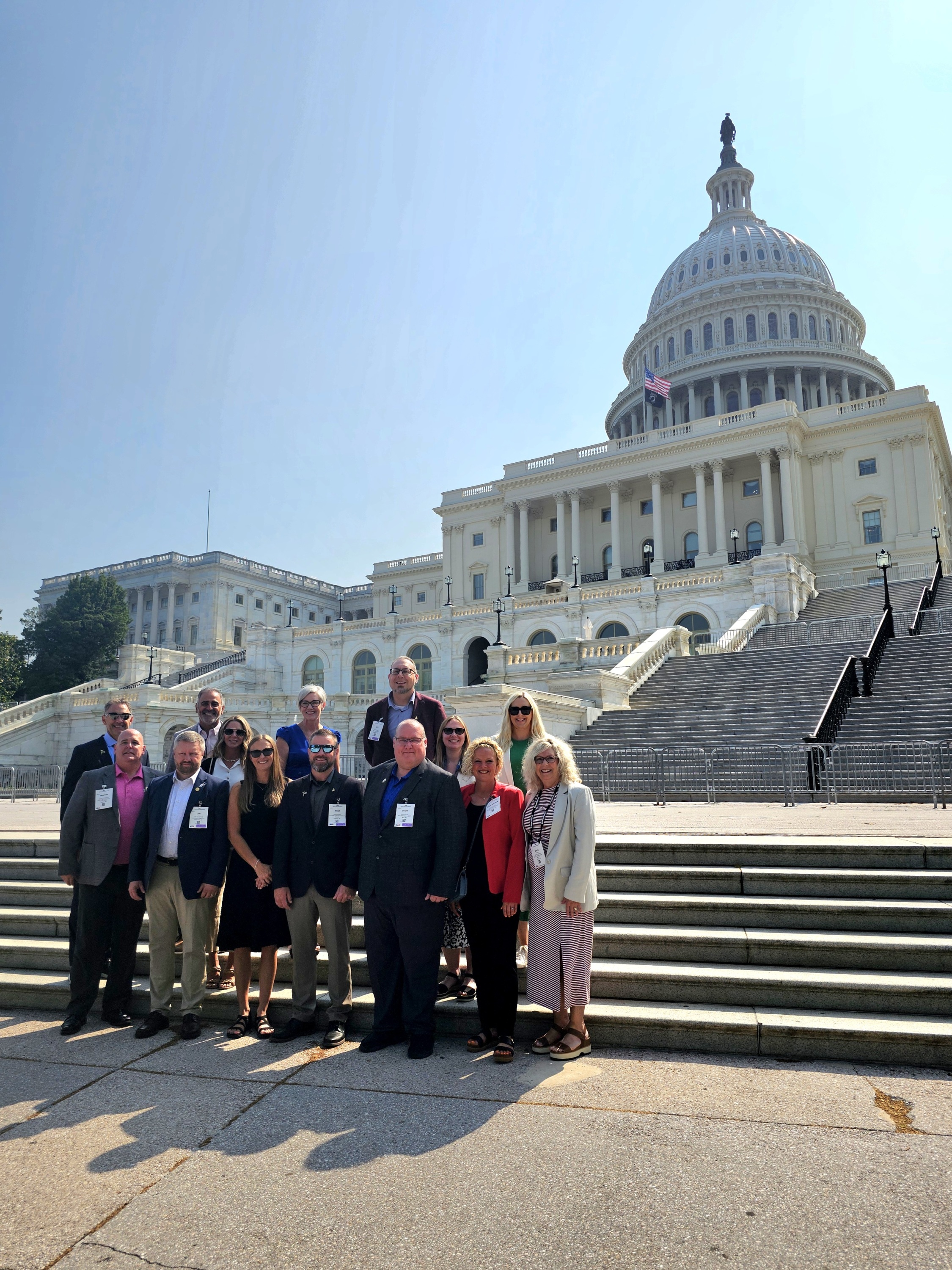BIA Advocacy Update
BIA-RRV leadership and staff visit Washington, D.C., Notice for disposal of demolition materials in Clay County, MN Legislative Special Session and ND State Building Code cycle
BIA-RRV Leadership and Staff Advocate for the Industry in Washington, D.C.
Along with NDAB leadership from around the state and over 1,000 NAHB members from across the nation, local leadership attended NAHB's Spring Leadership and Legislative Conference in Washington, D.C. June 12-15.
In addition to meetings hosted by the national association regarding education, land development, membership and more, we were able to meet with U.S. Senator Kevin Cramer, U.S. Senator John Hoeven and U.S. Representative Julie Fedorchak.

Above: NDAB and BIA-RRV leadership and staff on the steps of the United States Capitol.
Meetings centered around three top priorities:
1. Energy Codes: we encouraged our lawmakers to support legislation preventing the U.S. Department of Housing and Urban Development (HUD) and the U.S. Department of Agriculture (USDA) from requiring a minimum energy standard of the 2021 International Energy Conservation Code (IECC) and ASHRAE 90.1-2019 for certain single-family and multifamily housing programs. Compliance with the 2021 IECC can add more than $22,000 to the price of a new home. We also backed the Energy Choice Act, which would stop states and cities from banning natural gas in new homes, preserving energy options. While our state generally has great support at the federal level regarding access to natural gas, we wanted to ensure other states have that same access and freedom of choice, particularly considering affordability and reliability.
2. Workforce Development: we highlighted the ongoing labor shortage in the industry and its impact on housing attainability. We advocated for support of the bipartisan CONSTRUCTS Act, which supports skilled trades training, and encouraged reform of the Job Corps program, not elimination.
3. Tax Policy: we asked lawmakers to preserve and strengthen key provisions of the Tax Cuts and Jobs Act, including expanding the Low-Income Housing Tax Credit and maintaining the SALT deduction, both important tools for housing attainability.
While we also discussed other pertinent items, including tariffs, these were our main topics to address and we're pleased that our congressional delegation was receptive to our comments.
View some highlights from the trip here!
Notice for disposal of demolition/construction materials in Clay County, Minn.
According to a release from Clay County, residents can no longer dispose of demolition or construction material at the privately-owned Clay Demolition Debris Landfill. Instead, materials must be taken to the Clay County Landfill at 3301 190th St S, Hawley, MN 56549, until further notice.
Read the release here.
Minn. Legislative Special Session ended with a budget agreement
Gov. Tim Walz called for a special session on June 9 to come to an agreement on budgets left unresolved after the regular session adjourned in mid-May.
Of particular note for the industry were changes included in the Jobs, Labor and Economic Development Omnibus Bill (S.F. No. 17) :
- Paid Family and Medical Leave (program begins Jan. 1, 2026)
- Reduces the maximum premium levied by the Dept. of Employment and Economic Development (DEED) from 1.2% of taxable income to 1.1%.
- Earned Sick and Safe Time changes effective Jan. 1, 2026
- Notice on the usage of ESST hours can now be required as "reasonably required by the employer." Previously, employers could require notice from employees "as soon as practicable."
- Allows employers to require documentation if ESST is used for two or more consecutive scheduled work days, previously it was three days.
- Clarifies that there is no prohibition of an employee voluntarily finding or trading shifts with a replacement worker to cover ESST hours used.
- Employers may advance ESST hours based on an employee's projected work hours for the remaining portion of the accrual year.
Article 5: Department of Labor and Industry
Included many changes that impact the industry. We highly encourage those doing business in Minnesota to review this section.
- Rest breaks: specified that fifteen minutes is the amount of time an employee is entitled to take as a rest break every four hours. Currently, the rest break requirement is stated as “adequate time.
- Meal break: a meal break provided by employers needs to be at least 30 minutes for every six consecutive hours worked. Currently, the meal break requirement is stated as “sufficient time.”
- Introduced a tiered systems for fees regarding inspections, permit and design. All fees were increased as well. These particularly impact electrical, plumbing and manufactured/prefabricated homes.
Click here to read the bill and go to page 154/192 for the details of Article 5.
North Dakota State Building Code
The state is currently going through the process of adopting new codes for building. The North Dakota Legislature mandated that the state building code consist of the International Building Code (IBC), International Residential Code (IRC), International Mechanical Code (IMC), and International Fuel Gas Code (IFGC).
Background: North Dakota is a home rule state, meaning if a city, county, or township elects to adopt and enforce building codes, it must adopt and enforce the State Building Code, but they are permitted to further amend the State Building Code to conform to local needs. Fully chartered home rule cities may adopt something other than the State Building Code, but at the present time, all that enforce a building code have elected to adopt the same individual codes that make up the State Building Code.
Currently, the Building Code Advisory Committee has been meeting to review proposed amendments. You can view the schedule for the code adoption process here. The new code will be effective Jan. 1, 2026.
A list of the proposed amendments can be accessed here.
BIA-RRV was involved in reviewing the proposed amendments by the City of Fargo and provided comments and suggestions. If you have concerns, comments or questions, reach out to Elizabeth Kosel, elizabeth@buildrrv.org or (701) 232-5846.


